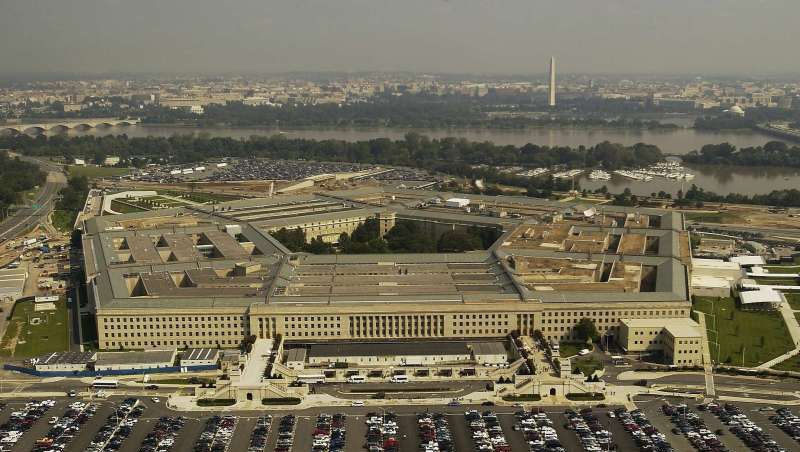
Senate Majority Leader Chuck Schumer, D-N.Y., said Wednesday that if his colleagues “continue embracing bipartisanship, we will finish our work on the NDAA before the start of the August state work period” – which begins tomorrow.
The upper chamber began taking its swing at the annual defense policy bill on July 18, having voted on 24 amendments for the fiscal year (FY) 2024 National Defense Authorization Act (NDAA) over the past two weeks – with more votes slated as the Senators rush towards the recess finish line.
“We wish to finish the NDAA as soon as we can. There is no reason for delay. We aren’t quite there yet – there’s still some more work to be done – but we are close,” Sen. Schumer said on the Senate floor on July 26. “I thank my colleagues for their cooperation, and the Senate will continue working on the NDAA until the job is done.”
The democratic leader introduced a manager’s package of 51 amendments on July 19 – 21 from republicans, 21 from democrats, and nine bipartisan – guaranteeing their passage alongside the NDAA’s.
Leaders also introduced a second bipartisan package today of another 48 uncontroversial amendments that will tack onto the defense bill, making them all but certain to pass the chamber.
“Last night, we ran a hotline that includes a few additional votes and a manager’s package of 48 amendments: 23 from Democrats, 23 from Republicans, and two bipartisan,” Sen. Schumer said on the Senate floor today. “Each side of the aisle has amendments they really want in that manager’s package and a good number of them were bipartisan.”
Since July 19, the Senate has voted on 24 amendments to the $886 billion defense bill, and more votes are scheduled for this afternoon. With the amendment needing to receive a majority of 60 votes in the affirmative to pass, only 16 have made it so far onto the final version of the Senate’s FY24 NDAA.
Tech, Cyber Provisions Have Clear Path With Senate NDAA
The Senate overwhelmingly backed an amendment to the NDAA on Tuesday that would require U.S. companies to notify Federal agencies of investments in Chinese technologies such as semiconductors and AI.
The 100-member legislative body advanced the provision with a vote of 91-6.
The amendment is a version of the Outbound Investment Transparency Act, offered by Sens. Bob Casey, D-Penn., and John Cornyn, R-Texas, to address the risks of U.S. investment going to foreign adversaries like China.
Sen. Cornyn expressed that the adoption of the amendment to the NDAA is “a step forward for our national security and a clear signal the United States is taking China’s aggression seriously.”
“China has become the United States’ greatest geopolitical competitor. Whether it is their purchase of our farmland or America’s critical supply chains being shifted to China, it is a threat deserving our attention,” Sen. Cornyn said when his amendment was approved on July 25.
“It’s not often that 91 senators can unite on a single measure,” Sen. Schumer said after the passage of the amendment. “So, to see us unite on outcompeting the Chinese government was an important demonstration that this issue remains broadly bipartisan and something we’ll continue working on throughout the year.”
There are several other tech and cyber amendments that, if approved, will have final passage on the Senate NDAA – before the two legislative chambers come together in a bicameral conference committee to reconcile the two bills into a single bill.
Several high-level provisions on quantum and AI are included, calling on a handful of agencies to submit reports on AI regulation in the financial services industry; requiring the DoD to create a bug bounty program from AI models used in defense operations as well as an assessment of the vulnerabilities in AI tools used for military operations.
Sens. Robert Menendez, D-N.J., and James Risch, R-Idaho, introduced the State Department Authorization Act as an amendment to the NDAA, which would require the agency to provide enhanced cyber protections – such as training and services – to personnel whose personal email accounts and devices are deemed at high risk of cyberattack.
The bill also requires the establishment of a chief AI officer at the Department of State, while also strengthening the role of chief information officer at the agency.
The provision would also create a Cyberspace, Digital Connectivity and Related Technologies fund and a Digital Connectivity and Cybersecurity Partnership, both aimed at helping foreign governments secure cyberspace.
Majority Leader Schumer and Sen. Mike Rounds, R-S.D., are leading an amendment – Unidentified Anomalous Phenomena (UAP) Disclosure Act of 2023 – to increase transparency around UAP, also known as UFOs, and further open scientific research.
The 64-page provision would direct $20 million to the National Archives and Records Administration (NARA) to create a collection of records to be known as the UAP Records Collection and direct every government office to identify which records would fall into the collection. The UAP Records Collection would carry the presumption of immediate disclosure, which means that a review board would have to provide a reasoning for the documents to stay classified.
“For decades, many Americans have been fascinated by objects mysterious and unexplained and it’s long past time they get some answers,” said Sen. Schumer. “The American public has a right to learn about technologies of unknown origins, non-human intelligence, and unexplainable phenomena. We are not only working to declassify what the government has previously learned about these phenomena but to create a pipeline for future research to be made public.”
